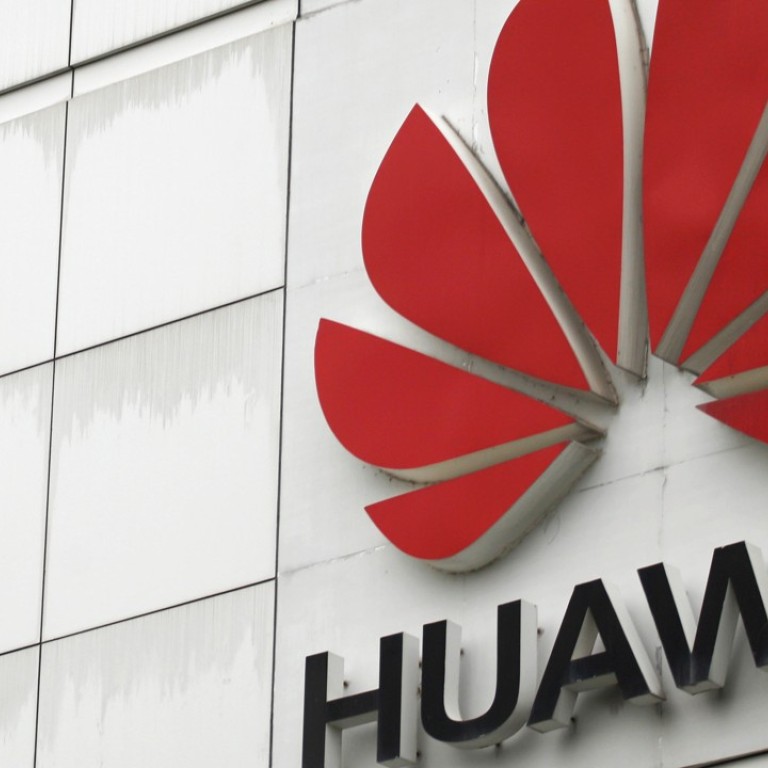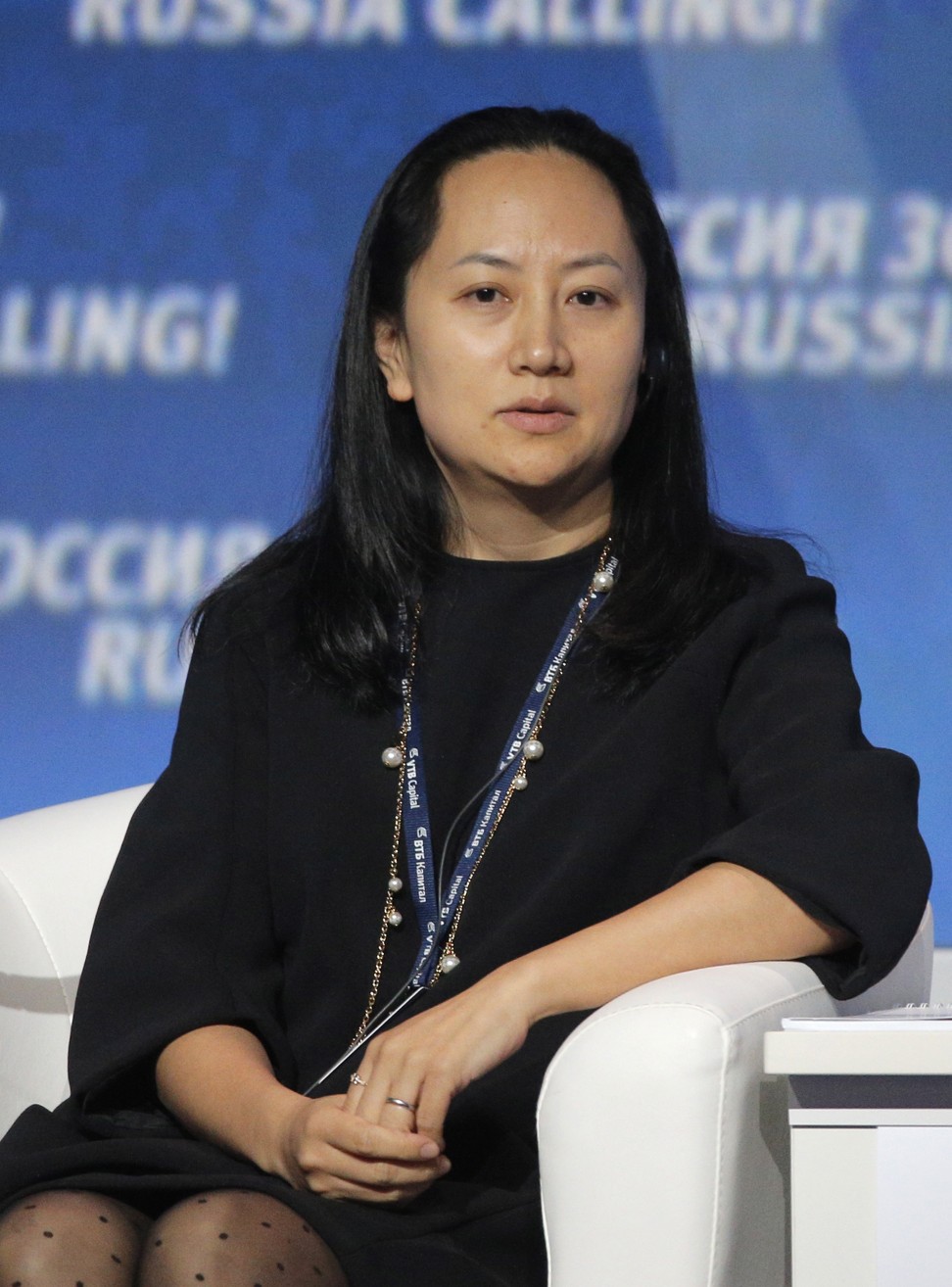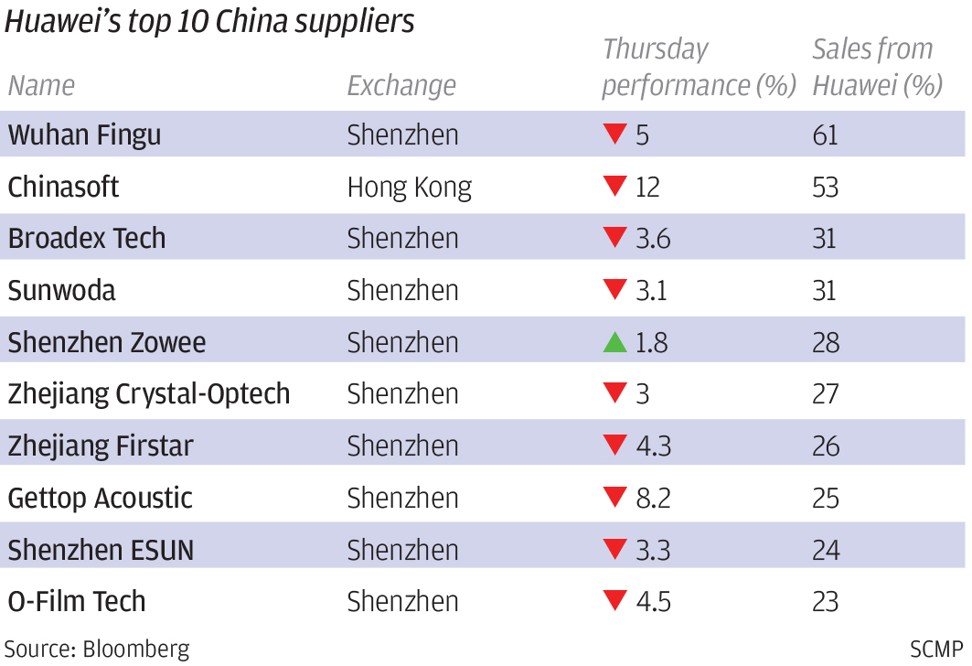
China, Hong Kong shares tumble amid growing worries about US-China relations after arrest of Huawei CFO Sabrina Meng Wanzhou
- Chinese telecom equipment makers linked to the 5G network tumble on jitters about possible US containment measures
- Also, Hong Kong developer Hopewell Holdings unveils HK$21.26 billion privatisation plan, sending prices of its shares soaring
Stock benchmarks in the two markets closed down, with the Shanghai Composite Index falling 1.68 per cent and the Hang Seng Index dropping 2.47 per cent. Shennan Circuits and Chinasoft International, both major suppliers to Huawei, were hammered in the mainland and Hong Kong markets, falling 9.66 per cent and 11.71 per cent respectively.
Just days after China and the US reached a 90-day truce on the trade front, Huawei CFO Sabrina Meng Wanzhou was detained on December 1 by Canadian authorities at the request of the American government. The US is requesting her extradition. Meng – the daughter of Huawei founder Ren Zhengfei, one of China’s leading businessmen, an ex-People’s Liberation Army officer and an elected member of the 12th National Congress of the Communist Party of China – was arrested because she allegedly attempted to evade a trade embargo placed by the US on Iran, The Globe and Mail reported, citing a Canadian source.
The detention has cast a shadow over the 90-day trade negotiations between China and the US and rekindled concerns among investors about additional measures the White House may seek to contain China’s technology sector, particularly the fifth generation wireless networks. Earlier, Huawei’s main rival ZTE was almost put out of business and lost more than 70 per cent of its market value after the Chinese company was banned from buying key American technologies for violating US sanctions against Iran and North Korea.
“There probably will be more such conflicts and clashes over the China-US trade negotiation and that sets the stage for more volatility in the market,” said Wu Kan, an investment manager at Soochow Securities in Shanghai. “The US has a clear intention of containing China’s development and China’s technology industry will bear the brunt.”
The Shanghai Composite fell 44.62 points to 2,605.18. The gauge slid below its 60-day moving average on Thursday after three times earlier in the year briefly climbing above the key technical resistance before returning to the downward track.
The Hang Seng Index dropped 663.16 points to 26,156.38, and the Hang Seng China Enterprises Index, or the H-share gauge, sank 2.57 per cent.
All indices on the Shanghai Composite and Hang Seng Index were down.

A gauge of China’s 10 biggest publicly traded suppliers of Huawei slumped 3.9 per cent on Thursday in a declining market, more than the 2.2 per cent drop in the CSI300 Index, which tracks performances in both Shanghai and Shenzhen.
Among them, Wuhan Fingu Electronic Technology, which derives 61 per cent of its sales from Huawei, slid 5 per cent to 6.12 yuan in Shenzhen; Chinasoft International, which relies on the Chinese telecoms company for 53 per cent of its sales, tumbled nearly 12 per cent to HK$4.07. Broadex Technologies lost 3.6 per cent to 34.48 yuan and Sunwoda Electronic lost 3.1 per cent to 9.15 yuan.
Shennan Circuits slumped 9.66 per cent to 75.00 yuan in Shenzhen, O-Film Tech plunged 4.46 per cent to 10.70 yuan, Lens Technology shed 4.02 per cent to 7.65 yuan and Tongda Group slid 1.15 per cent to 86 Hong Kong cents.
Telecom equipment makers linked to China’s fifth generation wireless networks were among the worst-performing industry group on the mainland’s exchanges. ZTE tumbled 5.69 per cent to 19.89 yuan in Shenzhen and Dingli, a software supplier to telecom equipment, plummeted by 10 per cent to 6.46 yuan.
Meanwhile, pharmaceuticals were slammed over concern drug makers may have to lower prices significantly to qualify for a new procurement mechanism by the central government.
Prices of drugs in a government procurement list were cut, reported the Shanghai Securities News, due to initial tender results.
Sino Biopharmaceutical shed 15.97 per cent to end at HK$5.84, its lowest price since October 2017, while CSPC Pharma slumped 14.48 per cent to HK$13.82, its lowest price since November 2017.
Meanwhile, shares of Hong Kong property developer Hopewell Holdings surged over its privatisation plan, and traded up 30.62 per cent to HK$34.55 by close.
Chinese game distributor iDreamSky Technology Holdings belly-flopped in its Hong Kong initial public offering, closing 8.6 per cent lower from its offer price to HK$6.03 in its debut.



